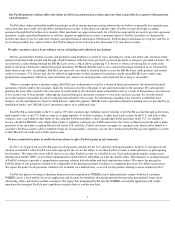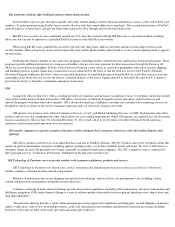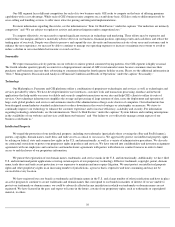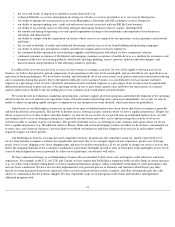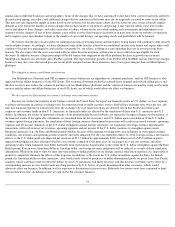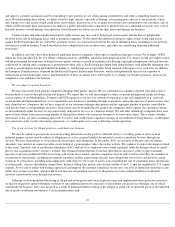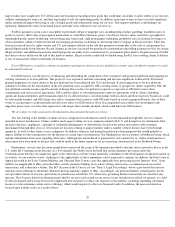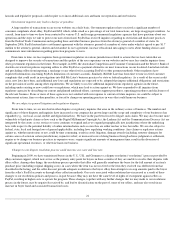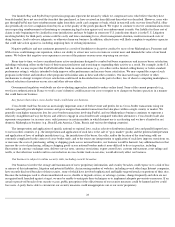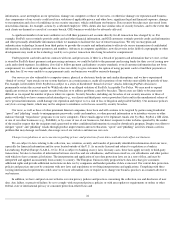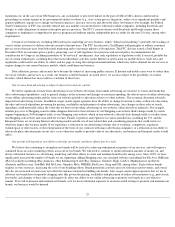eBay 2011 Annual Report Download - page 20
Download and view the complete annual report
Please find page 20 of the 2011 eBay annual report below. You can navigate through the pages in the report by either clicking on the pages listed below, or by using the keyword search tool below to find specific information within the annual report.
Bill Me Later's operations depend on lending services provided by an unaffiliated lender.
In November 2008, we acquired Bill Me Later, a company that facilitates credit services offered by an unaffiliated bank. Bill Me Later is
neither a chartered financial institution nor is it licensed to make loans in any state. Accordingly, Bill Me Later must rely on a bank or licensed
lender to issue the Bill Me Later credit products and extend credit to customers to offer the Bill Me Later service. Currently, when a consumer
makes a purchase using a Bill Me Later credit product, the chartered financial institution extends credit to the consumer, funds the extension of
credit at the point of sale and advances funds to the merchant. We subsequently purchase the receivables related to the extensions of credit made
by the chartered financial institution and, as a result of the purchase, bear the risk of loss in the event of loan defaults. Although the chartered
financial institution continues to own each customer account, we own the related receivable and Bill Me Later is responsible for all servicing
functions related to the account.
In September 2010, WebBank became the issuer of the Bill Me Later credit products. WebBank is an industrial bank chartered by the State
of Utah. Any termination or interruption of WebBank's ability to lend could result in our being unable to originate any new transactions for the
Bill Me Later service, which would require us to either reach a similar arrangement with another chartered financial institution, which may not be
available on favorable terms, if at all, or to obtain our own bank charter, which would be a time-consuming and costly process and would subject
us to a number of additional laws and regulations, compliance with which would likely be burdensome.
A lawsuit has been filed against Bill Me Later, PayPal and eBay in the U.S. District Court for the Northern District of California, alleging
that in its relationship with the chartered financial institution, Bill Me Later is acting as the true lender to customers in violation of various
California laws, including the state's usury law. The court dismissed the usury claims in December 2010, but breach of contract and other claims
remain. WebBank requested to intervene in the action and has been added as a party to the action, and in October 2011, the court transferred the
case to the U.S. District Court for the District of Utah. We believe that these allegations are without merit and intend to defend ourselves
vigorously. However, this area of law is uncertain and if the lawsuit is successful, Bill Me Later may be required to change its methods of
operations, pay substantial damages and reduce some of its charges and fees, which would likely adversely affect our business.
If our Payments business is found to be subject to or in violation of any laws or regulations, including those governing money transmission,
electronic funds transfers, money laundering, counter-
terrorist financing, sanctions, banking and lending, it could be subject to liability, licensure
and regulatory approval and may be forced to change its business practices.
Our Payments business is subject to various laws and regulations in the U.S. and other countries where it operates, including those
governing money transmission, electronic funds transfers, money laundering, counter-terrorist financing, sanctions, banking and lending. The
legal and regulatory requirements that apply to our Payments business vary in the markets where we operate. While PayPal has a compliance
program focused on compliance with applicable laws and regulations and has significantly increased the resources of that program in the last
several years, there can be no assurance that we will not be subject to fines or other enforcement actions in one or more jurisdictions or be required
to make changes to our business practices or compliance programs to comply in the future.
While PayPal currently allows its customers with credit cards to send payments from 190 markets, PayPal only allows customers in 110 of
those markets (including the U.S.) to receive payments, in some cases with significant restrictions on the manner in which customers can
withdraw funds. These limitations may affect PayPal's ability to grow in these markets. Of the 190 markets whose residents can use the PayPal
service, 31 (27 countries plus four French overseas departments) are members of the European Union, or EU. Since 2007, PayPal has provided
localized versions of its service to customers in the EU through PayPal (Europe) S.à r.l. et Cie, SCA, a wholly-owned subsidiary of PayPal that is
licensed and subject to regulation as a bank in Luxembourg. Accordingly, PayPal (Europe) is subject to significant fines or other enforcement
action if it violates the disclosure, reporting, anti-money laundering, capitalization, funds management, corporate governance, sanctions or other
requirements imposed on Luxembourg banks. Any fines or other enforcement actions imposed by the Luxembourg regulator could adversely
affect PayPal's business. PayPal (Europe) implements its localized services in EU countries through a “passport” notification process through the
Luxembourg regulator to regulators in other EU member states pursuant to EU Directives, and has completed the “passport” notification process
in all EU member countries. The regulators in these countries could notify PayPal (Europe) of local consumer protection laws that will apply to its
business, in addition to Luxembourg consumer protection law, and could also seek to persuade the Luxembourg regulator to order PayPal
(Europe) to conduct its activities in the local country through a branch office. These or similar actions by these regulators could increase the cost
of, or delay, PayPal's plans for expanding its business in EU countries. In addition, national interpretations of regulations implementing the EU
Payments Service Directive, which established a new regulatory regime for payment services providers, may be inconsistent, which could make
compliance more costly and operationally difficult to manage.
15


